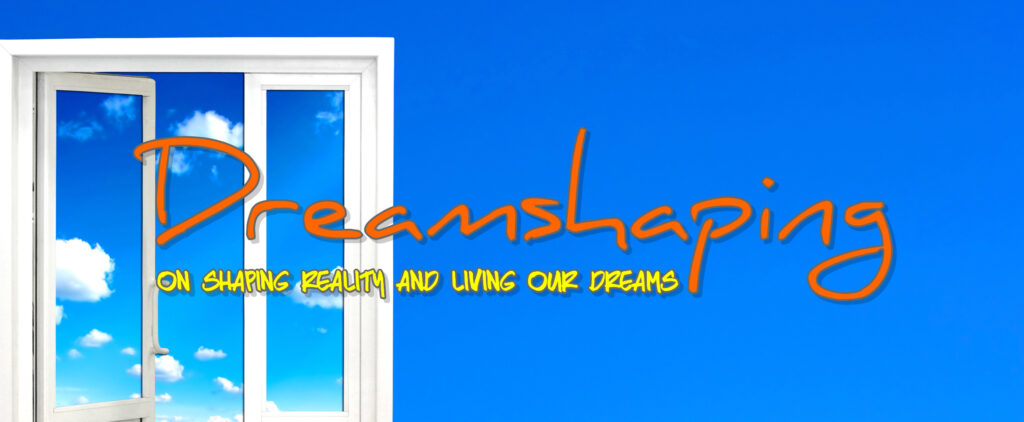Dreamshaping: The ‘What If?’ List

By Mark McNease
I’ve used a ‘What If?’ list in my fiction writing, especially when I feel stuck in the journey of a story. Where should it go? Where do I want it to go? How can I imagine the next turn in the road for these characters?
I don’t like to admit that I sometimes find myself unable to tell which direction a story should take, and that includes the story of my life. So when I recently found myself feeling indecisive, even to the point of thinking I couldn’t do much of anything, I wrote a ‘What If?’ list for myself.
WHAT IF I set aside the novel writing for 90 days or so?
WHAT IF I truly opened up that creative space and let something else come into it?
On Dreamshaping: The Slippage of Time

Are human beings the only animals aware of time passing? Do cats know they’re getting old? Do fish ever wish they’d swum in this direction instead of that one? Is a tree concerned at all with the number of years it has stood rooted in one spot?
When we were children, most of us had occasion to hear those words, “When you’re older …” We were told that someday we would be able to drive a car, or go on a date, or leave home. Patience was required, tested by anticipation and desire. We waited because we had to, and each time we reached that milestone, that magical “older,” and we got our driver’s license, or we went on a first date, we looked ahead to the next thing we could experience when the time came.
An Introduction to Dreamshaping

Introduction
“All things are of the substance of dreams.” For many years that has been my personal mantra, my code, if you will, to live and dream by. Explaining what this means is tricky. I’ll start with saying what it does not mean: It does not mean that nothing we experience is real. It does not mean we should rely on wishful thinking to create the kinds of lives we want to live. In my experience, wishes are for birthday cakes, fleeting and usually unrealized unless the odds of them coming true were already in our favor. It does not mean life is free from struggle, or that the dream of it is meaningless because we’re just going to wake up someday and realize we never existed.
Life as we experience it is the ultimate lucid dream—those dreams in which we become aware that we’re dreaming. We look around us in the dream we’re having, and we understand within the dream that we have the power to create it, frame by frame. We are suddenly unbound by the rules of everyday life, in which options are few and our days are filled with things we must do: work at jobs we don’t really like, meet obligations we would prefer to be free from, remain in relationships that are poisoning us, and generally live in a state of low-grade helplessness. The world is going mad! Polarization and politicization, partisanship and mistrust, lives that feel like a grind, wearing us down as we endure them rather than celebrate them. We hope to survive to that end of the tunnel we’ve been travelling toward, where light, and Social Security, and freedom are enjoyed for a few golden years that rush by like water over a dam. But then, if we want to, we wake up in the dream and realize it’s a dream. We’re not truly stuck. We can make choices. We can be our own dream guides, leading ourselves each day as we both live this dream and create it.
On Dreamshaping: The Empty-Handed Life
Audio Player
Hands aren’t only for holding and grasping—they’re also for teaching us what it’s like to surrender, palms up, empty-handed. The nothing we find there is often the something we need.
It’s hard to let go of our many identities. Getting up and writing has been ‘who I am’ for forty years or so. The fear we all have is that when something leaves our lives, whether it’s a job, or a creative activity, or a person, we won’t know who we are without it. This is acutely present with caregivers: taking care of someone becomes our identity, and when that person is gone, the loss is compounded by losing the sense of self it gave us: what am I going to do now? How will I spend my days or nights? What will define me?
Dreamshaping: Seeds of Doubt
Audio Player
Enjoy an audio small plate. Her name is Bella, and she’ll be your server today.
It’s never too early to doubt yourself. While that’s unlikely to be spoken by the most advanced two-year-old, it seems to be one of the earliest concepts we learn. We teeter on our tiny feet, attempting to walk for the first time. The giants in our lives encourage us, cheering us on to put one foot in front of the other, and then … we tumble. Our faces scrunch up. We probably cry. We wait awhile, looking for signs of approval, and we try again.
On Dreamshaping: Treating Ourselves to Illness

Mark McNease
Audio PlayerI recently spent several weeks with a cold—or a flu, or a sinus infection, or some dreadful combination of them all. A cough still lingers, the voice still gives out if I talk for more than a few minutes. This kind of seasonal illness has been with me for most of my life. It brings discomfort and frustration, dread at what awaits me in my elder years, and the perfect excuse to start reaching for those comfort foods and behaviors I believe I’m entitled to under the circumstances because I deserve this. It’s a way to quickly short-circuit any deeper or prolonged analysis of what’s really happening: I’m in a sate of discomfort, and I want something to make me comfortable that doesn’t require more effort than getting it from an ice cream container into my mouth.
On Dreamshaping: Mission Accomplished

Mark McNease
Audio PlayerI’m on a mission. How many times have we said this to ourselves? How many times have we told it to the people around us? Being on a mission is a way of focusing our attention and energy onto whatever that mission is. For a few people there may be one overriding mission in their lives—to be an actor, a writer, a doctor, the raiser of a family—but for most of us there are multiple missions that change over time. We may be on a mission to earn a degree during our college years, or to succeed without one. We may be on a mission to raise children, or to live our fullest lives without them. We may be on a mission to lose weight, or further our careers, or even to find the kind of inner peace that surrenders missions altogether! That’s a little closer to nirvana than I will likely ever come, so I accept that I have missions. The challenge is finding the best ways to pursue them.
It’s okay to have a goal, to see a particular destination in the distance that we work our way toward. A mission can be as narrow as arranging an event and having it go off to our satisfaction, or as wide and critical as surviving our formative years. I’ll admit I’d been on a mission to get through high school and leave the town I’d grown up in. It was among the most difficult missions of my life, but it is a mission accomplished. I made it. I thrived. I found other, less life-threatening missions to devote myself to.
On Dreamshaping: The Wrong Idea

Mark McNease
Audio PlayerIf you spend much time watching television or browsing the Internet, you’ll quickly realize what advertisers have been telling us all our lives: that there is something wrong with us. Vast fortunes are made by people convincing us we’re naturally defective and the best way to repair our damaged selves, if they can be repaired at all, is by using whatever product they’re selling. Hair loss? They’ve got the cure. Overweight? Try one of dozens of programs, apps and plans guaranteed to slim us down and give us a fighting chance of at least liking ourselves, if love is too much to hope for.
We’re told so often, for so long, that something is wrong with us that we internalize it early in life. Good, supportive parenting is to be admired and encouraged, but it’s often the exception to the rule. Too many parents discourage their children’s curiosity and self-expression, choosing to limit them instead, often because they’d been limited themselves. We grow up being much more familiar with don’t, can’t, won’t, than we are with do, can, will, or try. Too many parents see their children as extensions of themselves, including their own disappointments and unmet expectations. They want sons to play sports, girls to keep flower-covered diaries. They seek to create only slightly altered versions of themselves in the adults their children grow up to be.